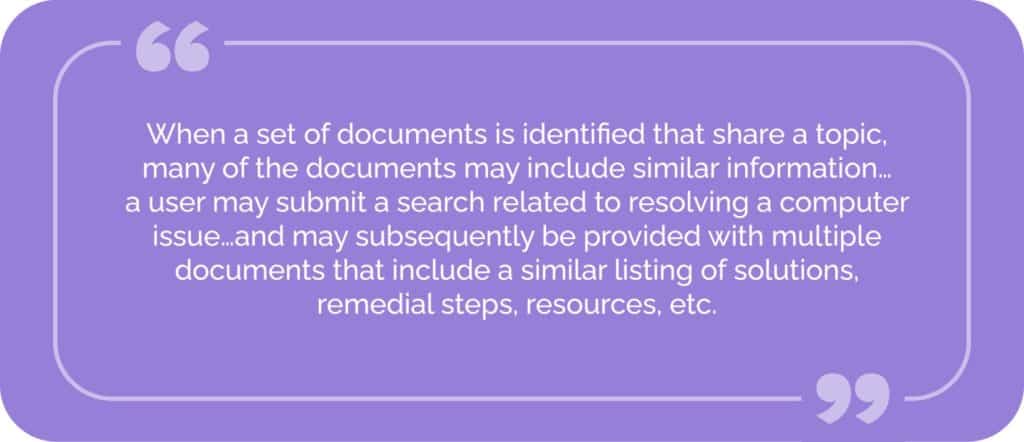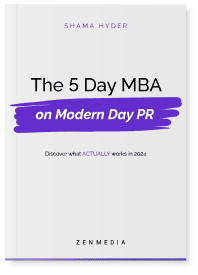Content marketing today can feel fruitless for marketers at small and mid-sized companies. I mean, who can compete with the goliaths that dominate search engine results pages? It can feel like every topic and keyword has already been swept up by big brands that are creating comprehensive, optimized content.
In the past, it would have been wise to consider this a loss. Move on, find a new topic or less inundated keywords, and try to make a dent where there isn’t so much competition. But in today’s world—where it seems life happens online more often than not—if you ignore the crowded search results, you’ll soon be empty-handed.
But if Google has anything to say about it (and they do), this battle isn’t lost yet. In fact, the underdogs are making a comeback. In April 2020, Google filed a patent that supports a concept called “information gain.”
What is Information Gain?
Information gain, in technical terms, is a method that can be used to optimize what is featured out of data sets. Its scientific origins deal with splitting entropy—but we don’t need to become data engineers to understand how Google tweaking its implementation of information gain and integrating the concept into its SEO algorithm will help up-and-coming brands break through the noise.
The concept of information gain itself isn’t new. In fact, in 2020, Google was noted to be using information gain in its search engine results, but back then, it wasn’t factoring in the quality of unique information. In fact, Google noted this as a problem its engineers were trying to solve:
Search results displayed similar and/or duplicative information. Very few offered anything new in terms of content, opinion, or focus.

Why Most Content Isn’t Optimized for Information Gain
In simple terms, information gain in this new context is a measurement of quality addition. Previously, large brands with perfectly optimized keywords woven throughout a long-form piece that answers every question a searcher could ask won the market share in search rankings. And then, copycat content would be created and distributed, and the entire search engine results page (SERP) would be flooded with eerily similar doppelganger content.
If a searcher had read one, they’d basically read them all.
In Google’s words:
“When a set of documents is identified that share a topic, many of the documents may include similar information…a user may submit a search related to resolving a computer issue…and may subsequently be provided with multiple documents that include a similar listing of solutions, remedial steps, resources, etc.”

This leaves Google with a problem. Searchers aren’t staying engaged. They aren’t refining their search, spending time on the platform, or clicking on new links. They’ve lost their curiosity.
How Information Gain Will Impact Search Results
To solve this, Google is prioritizing the presentation of different material on the same subject. So, to continue Google’s analogy, if a user searches for information to solve a computer issue, the highest-ranked site will now be the one that includes all of the common information found on all of the other pages—and additional unique information.
This gives small and mid-sized brands an opportunity to enter the big leagues of search ranks. While they may never have the budget to compete with conglomerates, they may have the right skills, marketing tactics, and knowledge to differentiate them from all the rest. Sure, a large company may have the information beautifully distilled into bite-sized tips and tricks, but a smaller business may have a subject-matter expert that can add depth to the conversation, not just breadth.
And depth is the priority for Google now.
Like influencers on social media, Google wants its audience to engage because it helps its bottom line.
So what can brands do in this new generation of B2B SEO to stay (or become) relevant? Here are some tips on how to win the information gain game.
Tips to Write for Information Gain
1. Be different, not just better.
With Google’s new system, articles are rewarded for being different, not just better. So if the content is measurably different from the current search results, even if it is the focus or opinion the content upholds, it is rewarded.
This could look like talking about your specific company’s take on a widely-held policy or regulation. It could be your CEO’s experiences learning about a particular topic and how that influenced the way they lead the business. Different is personalized. Different offers perspectives. Different is diverse. And different takes risks.
2. Take risks.
Deviating from the status quo is the definition of different. And to many well-established brands, that is much too risky behavior. I mean, most elderly folks wouldn’t risk jumping on a trampoline, right? Those large companies would never risk breaking a hip just to be different.
But the young, spry businesses? They are ready to disrupt. That is why the concept of information gain is such a huge opportunity for this sector of businesses hoping to reach a wider audience. Take a unique angle and fill in the blanks you notice on Google. Read what’s out there and form your own opinion—the more challenging, the better. Create risky content, and reap the rewards.
Related read: Where is the Line Between Edgy and Offensive Content?
3. Contribute to the collaborative ecosystem rather than fighting it.
Recognizing that you aren’t competing so much as you are collaborating will change the way you approach content marketing for B2B and help you perform better in Google’s new landscape. You’ll never be able to outperform the giants in your industry, so assume that you need to build on the blocks they’ve already begun with. Begin your content development with the assumption that your reader has already read the more extensive long-form piece from your competitor. Then ask yourself how you can add value beyond that. Can you offer more information? Give next steps that aren’t previously addressed? Write a more complete or in-depth how-to guide on a particular part of a process? Bring new information to the discussion, and your content will soar.
4. Share a wealth of original research.
Another priority in this new algorithm is primary research. Why? Primary research is always going to be the most updated—and thus, likely the most accurate—data for searchers’ queries. Anything new or proprietary will be rewarded in the search results because, as we discussed earlier, Google wants different information. It wants additive, relevant content that delves deeper than existing search results.
Want to level up your content marketing but not sure how to differentiate your brand from the rest?
Reach out. We’d love to help you master this new wave of SEO content marketing.








